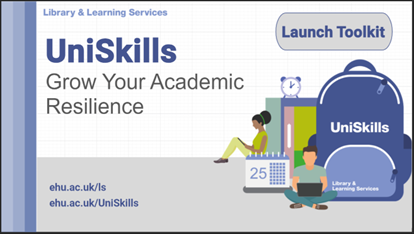
-
How to Get the Most Out of Your Assignment Feedback
Many students (and tutors!) have a love/hate relationship with feedback. Whatever your thoughts and feelings about feedback are, remember that using it proactively can be a really valuable tool to help you build your skills and confidence. Focusing on gathering and evaluating past feedback before the next assessment period is a useful way to help you identify key strengths, and also to know what you need to work on to improve or maintain your grades. Here are some of my top tips to help you get started.

Gather your feedback
Whatever year of study you are in, by this point in the academic year you will have received some feedback on previous pieces of assessment. Take some time to look back at your submissions so far, and gather all the feedback from your previous assessments. If you are in year 2, 3 or 4 of your study, you should now have a good range of feedback to consider.
Highlight the positives
Work through your feedback, highlighting all the positive comments and notice what you have done well. Have you thoroughly met the Learning Outcomes? Did you do a good job of writing critically? Have you articulated your arguments well?
Remember that feedback is often focused on ways to improve, so if there are no explicit comments about what you have done well, you can still identify positives by concentrating on what has not been said! If there are no comments in the feedback about your referencing and in-text citations, this likely means that you have already done a good job.

Focussing on the positives is a great way to build confidence and to recognise the skills you already have. Another way to do this is to identify your progress.
This is easier to do the more feedback you have, so if you are in year 1 maybe think about how you can identify and track your progress as you move into your year 2.
Track your progress
Think about any initial comments you received on improving your work that are no longer being highlighted. Have you improved your understanding of the referencing system you use, so your tutor no longer needs to comment in their feedback? Perhaps you once received feedback about the lack of structure in your work, that you are no longer finding comes up in current feedback. Identifying the progress you have already made is a great way to see how far you have come, as well as increasing confidence in your ability to improve in any other areas that you still want to tackle.
Identify recurring themes
Work through each piece of feedback and pick out any overarching themes that still need work. For example, you might notice that referencing errors have been frequently highlighted in your work. Or you may find that there are several comments which stress the need for you to develop an idea or argument.
Any elements that are regularly being raised are ones that you should be working on, and identifying the main concerns gives you a focus. Keeping track of comments from all your assignments, will help you to develop targets to work towards.

Tackling feedback can sometimes be an emotional experience, especially if you did not do as well as you had anticipated, or had hoped. Find out more about developing your feedback resilience in our UniSkills Grow Your Academic Resilience Toolkit.
Make a plan
Once you have identified any key recurring themes from your feedback you can be proactive by deciding how to tackle them. Pick the most commonly occurring theme or themes to focus on (a maximum of 3, as any more can feel overwhelming!) and think about how you will tackle them. For each theme it is useful to think about the following elements:
- What do you need to tackle?
- When will you do this?
- What support might you need?
Breaking down the steps in this way can give you a clear plan, with actionable goals, and a timeframe in which to tackle each theme. Our UniSkills Feedback Plan offers an example of how this might look. Planning in this manner means that you are more likely to act upon your feedback. An even better way to ensure that you are being proactive with your feedback is to make yourself accountable. You can do this by making your feedback plan visible (e.g., stick it to your fridge or cupboard door), or by telling someone what you plan to do.
TOP TIP: It is always important to read your feedback, however the most effective way to develop your skills is to think about how you will then act upon your feedback!
Remember that feedback on your assignments is designed to help you improve your academic skills! Now is a great time think about using your feedback proactively to help build your skills and confidence. Identifying key strengths, and seeing how far you have come can be a great springboard into a successful summer assessment period.
Don’t forget that if you would like any further support in breaking down your feedback, and knowing how to approach tackling it, you can book on to a one-to-one with an Academic Skills Advisor.
Good luck!

Helen Briscoe
-
Student Advisor ‘A Day in the Life’: Part 2
Hi, my name is Marrium and I am currently in my second year of my MBChB (Medicine) programme. Having been at university for a few years, I have gotten into a routine that I find supports me in achieving my academic goals as well as ensuring I am able to get the best out of my day as possible. This routine of daily activities is centred around the tenets of productivity, mindfulness and relaxation – I hope that this is a helpful insight into my daily life and a way that you can gain inspiration on how to base the structure of your day!

7:30am
The time that I usually wake up in order to feel well rested and prepared for the day ahead. Over time, I have learnt that developing a morning routine to delve into as soon as you wake up is critical as it sets the tone for the rest of the day. By ensuring that you have a morning routine, it allows you to start your day with intention as well as incorporating mindfulness practices to enhance productivity during the day. This can look like meditating, going to the gym, journaling etc. For me, I aim to do stretch exercises in my room to begin the day with physical activity to refresh myself. Another aspect to my morning that I enjoy is making a latte or cup of tea for myself. Whilst this is an ordinary aspect of most people’s mornings, I try to focus only on the process to slow my mind down before the busyness of the day ahead.
9am-5pm
During an average day for me as a medical student, I am usually in lectures for the majority of the day due to the content of my course being so heavy. Whilst I sit in lectures, I try to write up all of my notes for all the sessions by the end of the workday. This is primarily to ensure that I do not have a lot of work to complete by the end of the day as there are usually a lot of other assignments to hand in that are outside of lectures. This does not always get done, but it is more important to aim for consistency rather than perfection, which is much more attainable on a daily basis. My day can also consist of clinical skills sessions, placements or other activities if I am not in lectures, providing some variety every now and then.
5-6pm
With the bulk of the day being over, it is a habit of mine to allow myself time to recharge and relax. It can be very easy to fall into the tendency to overwork yourself, especially as the year comes to a close with deadlines approaching but it is important to make time to give yourself a break. I try to pepper these in during the day so that I am able to be more consistent with my workload by alternating work and breaks. During this break in particular, I focus on eating a meal and spending time with my flatmates to step away from work for a short while.
6-7:30pm
This time during my day is usually dedicated to revision or study time, as I am more than likely to have a backlog of tasks to complete as well as having lecture notes to type up and learn. I aim to learn the hardest topics during this time as it is when I am able to fully engage with the material to the best of my ability. If I am not spending time engaging with course material, I attend society meetings, go to the gym or attend my weekly Mandarin lessons.

8-11pm
This time is reserved to further study as well as being able to cook a good meal for myself. I enjoy cooking and baking very much, and love to spend time creating a delicious dinner for myself. Because it is enjoyable to me, I am likely to spend a decent amount of time in the kitchen – this is also the time that I am able to socialise with my flatmates who are usually in the kitchen as well. I would recommend that this time should be dedicated to study or the development of your own hobbies. With the way that university life can become increasingly busy throughout the year, the balance between self-care and development and your studies can be hard to manage. I find that slotting in specific times to pursue interests of your own means that you are less likely to burn out. It could also be a time to socialise – whether that be with friend or within the structures of a society to provide a healthy distraction from work.
11-12pm
Perhaps the most important time of the day as well as the time that I look forward to the most. During this time, my priority is to wind down from the likely busy day that I’ve had. Establishing a night routine is just as important as a morning routine, as it sets the tone for the night and allows you to relax. Being able to be relaxed right before sleeping means that you are more likely to get a full night of sleep, allowing you to be well-rested for the next day. My night routine consists of getting myself ready for bed, finding a series or movie to watch on Netflix and writing down my to-do list for the next day as I watch. This works best for me as I am able to reduce stress as well as being able to be prepared and plan for the next day that creates a sense of stability.
I hope that this has been helpful, or if not, at least a good insight into the daily life of a medical student. Bye for now!
-
Student Advisor ‘A Day in the Life’: Part 1
Welcome to part one of our Student Advisor ‘A Day in the Life’ blog series. Exam season can be stressful with coffee fuelled mornings and last minute study sessions. But never fear, your Student Advisors are here to share their wisdom and guidance to help you conquer your assessments. So, settle in as Amelia and Lewis tell you all about a typical ‘day in the life’ as they prepare for their own exams and assessments and reveal their top tips for fostering good study habits.

Amelia Betts – 1st year BA (Hons) Primary Education with QTS
Hi, my name is Amelia, and I am currently in my first year of Primary Education with QTS.
Some things about me are that I have done an archaeological dig; I love painting and I do a lot of jewellery making. I absolutely love cooking; I’m trying to master dumplings at the moment. On top of this, my favourite thing to do is spend time with my friends and flat mates, such as going to concerts, going out for dinner in Ormskirk or just watching movies in our flat. We also like to attend Edge Hill organised trips such as their Ikea trips, and various other opportunities they offer such as crafty activities on Saturdays.
As well as this, I am a Student Advisor. I am excited to help students with academic support, library support and overall guidance. I will also be involved in the UniSkills workshops to help support students get the most out of these sessions. I will provide this support by answering further questions and providing useful links to the Edge Hill website. I took on this role because I know firsthand how overwhelmed I felt in September, with my first assignment and so forwards so I wanted to provide some extra support to help some students with these challenges.
Some of my personal hacks to keeping on top of my workload is my diary. I take this everywhere with me and it helps me to keep track of everything I have going on. I also plan what I will do with my time, such as if I have an assignment due in two weeks, I will plan what I need to accomplish every day until it is complete. This helps take away any last-minute stress. In addition to this, I try and complete things as soon as possible so that they do not stack up, this drastically helped me manage my workload. But overall, what I found as the most important for managing my workload was breaks. University is a time of studying and academic achievement but that is not all, get involved in as many social events as you can to give your brain a break. This helps to avoid burning out and provides a nice work and social life balance.
Lewis Underwood – 3rd year BA (Hons) History
Hello, my name is Lewis Underwood and I’m one of your Student Advisors here at Edge Hill. As a current third year history student, my days often involve lots of studying and coursework so it’s important for me to find a good work-life balance. In this blog, I will detail what a day in my life entails and in doing so will hopefully give you some inspiration for your own personal study habits.
I usually wake up at around 8:30 where I then have a tea and breakfast to start my day. After this, I will usually go on a walk, often through Ruff Woods and then onto campus. However, if the weather is miserable, I usually have to miss out on the walk! I personally like to listen to a podcast on the walk as it helps wake me up and start the day right.
After I return from my walk I often like to go to the gym on campus. For me, physical exercise is one of the most important elements of my day-to-day life as it is not only a physical benefit but is also a great help for my mental health. Exercise puts me in the right headspace to study and get stuff done in my day and without it I often struggle to find the motivation to work on what I need to do.
After a good hour or so in the gym I head back home and make lunch. One of my favourite meals to have for lunch are super noodles with a fried egg on top, both easy to make and delicious. I then head to the Catalyst for around 2:00pm and set up on the silent study floor in one of the study booths.
My study sessions often revolve around the essay writing process as a history student, whether that be reading and research or the actual essay writing and editing itself. Whilst studying, I like to listen to music and have a specific study session playlist that keeps me both focused and motivated. I also like to grab a coffee at the start of my study session, often opting for a regular latte, which gives me much needed energy after a busy morning! I often employ the Pomodoro technique whilst studying which I feel allows me to get more work done and to a higher quality than I achieved before I adopted the technique. I often study for around 2-3 hours before heading home and clocking off from uni work until the next day!
Hope you have enjoyed reading Amelia and Lewis’ blog. For more study tips check out the Getting Organised web pages where you can find out more about effective time management, including the Pomodoro technique.
Good luck with your exams and assessments!


